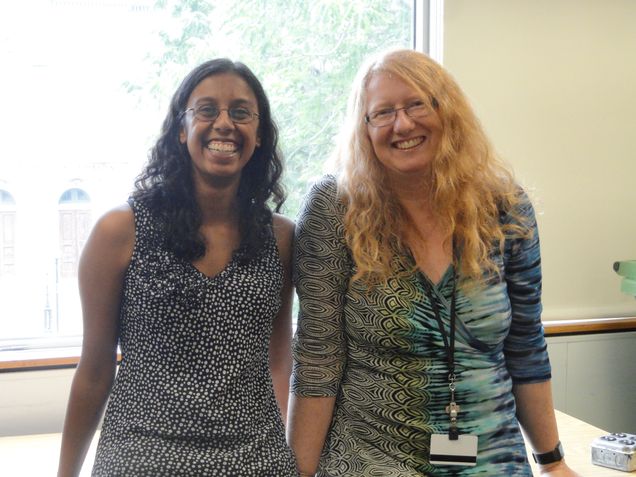Spotlight on Faculty: Dr. Symes & Dr. Dasgupta
 Science is constantly evolving, and with that comes the need for graduate education to adapt. Dr. Shoumita Dasgupta of the Genetics and Genomics program and Dr. Karen Symes of the Biochemistry Department agree. With a group of other dedicated GMS faculty, they have transformed doctoral education at BUSM through the development of a new and engaging curriculum.
Science is constantly evolving, and with that comes the need for graduate education to adapt. Dr. Shoumita Dasgupta of the Genetics and Genomics program and Dr. Karen Symes of the Biochemistry Department agree. With a group of other dedicated GMS faculty, they have transformed doctoral education at BUSM through the development of a new and engaging curriculum.
Can you tell me a little about the Foundations in Biomedical Sciences (FBS) curriculum?
Dr. Dasgupta: The evolution of the new FBS curriculum is based on redefining what scientific literacy means for doctoral students in the biomedical sciences. It is a series of courses designed for first-year doctoral candidates that will serve as a foundation for the rest of their doctoral education. The curriculum integrates many fields of science to teach Ph.D. students interdisciplinary thinking.
Dr. Symes: The courses incorporate topics from a wide range of disciplines including biochemistry, biophysics, cell and molecular biology, genetics and physiology. Touching on all of these fields, the courses are designed to reflect the way interdisciplinary science is conducted, as well as to coordinate content across courses and programs.
Dr. Dasgupta: The FBS curriculum has been designed so that the students take four core modules. The fifth module consists of electives whose purpose is to allow the student to take an integrated course in an additional discipline.
Why is an integrated curriculum so important?
Dr. Symes: Science has evolved so much over the past decade. It is not only important to have the knowledge of other scientific fields, but also to have the ability to use that knowledge critically. Science is increasingly an interdisciplinary endeavor and it is important to be able to incorporate elements from other fields into your own research.
Dr. Dasgupta: This new curriculum will really focus on the process of intellectual development. The courses will encourage students to take what they already know and expand on it as they ask and answer questions across scientific disciplines. A curriculum like FBS allows the students to put together a scientific story from multiple perspectives at once.
Is BU the first university to use this kind of curriculum?
Dr. Symes: No, integrated science curriculums can be found at a lot of other colleges and universities. When the movement to form such a curriculum for Boston University was initiated, the committee looked at other graduate school models, however, FBS is truly a BUSM derived curriculum. No other school has done it quite the way that we have.
How did you get involved in graduate education?
Dr. Symes: I took a very typical route into graduate education. I established myself as a researcher first. However, as I began to teach, I found that I loved it. I soon became interested in the development of higher education, which led to my involvement in designing the FBS curriculum.
Dr. Dasgupta: I began in higher education as an educator when I was hired to develop graduate and medical curricula in genetics and genomics. I have always been interested in working with students both in the classroom and as a mentor, so I greatly enjoy my roles as course director and program director.
Do you find you still have time to research and participate in the sciences?
Dr. Symes: My lab worked on understanding the molecular basis of cell movements in early embryonic development.
Dr. Dasgupta: My current research is in education, focusing on different teaching strategies and methods in the context of graduate and medical education.
What advice would you give to GMS students regarding courses, or in general?
Dr. Symes: Invest in your own education, because the more you put into it, the more you will get out of it. I know it sounds clichéd, but it is true.
Dr. Dasgupta: Work collaboratively with your peers, faculty, and mentors. Try to find people with expertise relevant to your area of study to enrich your own education.